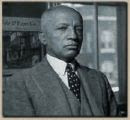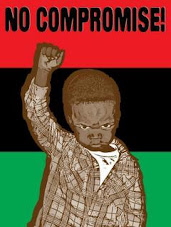 Smoking rates among African American adults historically have been higher than among the general U.S. population; however, in recent years smoking rates have been similar. Smoking among African American teens has declined dramatically since 1976; however, recent increases in teen smoking among African Americans document the need for continued prevention efforts. African Americans continue to suffer disproportionately from chronic and preventable disease compared to white Americans. Of the three leading causes of death in African Americans -- heart disease, cancer, and stroke -- smoking and other tobacco use are major contributors to these illnesses.1
Smoking rates among African American adults historically have been higher than among the general U.S. population; however, in recent years smoking rates have been similar. Smoking among African American teens has declined dramatically since 1976; however, recent increases in teen smoking among African Americans document the need for continued prevention efforts. African Americans continue to suffer disproportionately from chronic and preventable disease compared to white Americans. Of the three leading causes of death in African Americans -- heart disease, cancer, and stroke -- smoking and other tobacco use are major contributors to these illnesses.1 - Each year, approximately 45,000 African Americans die from a smoking-related disease that could have been prevented. 2
- If current patterns continue, an estimated 1.6 million African Americans who are now under the age of 18 will become regular smokers. About 500,000 of those smokers will die of a smoking-related disease.2
- Aggregated data from 1994 and 1995 show that current smoking prevalence rates were similar among African American adults (26.5%) and white adults (25.9%) in the United States. 3
- In 1995, about 5.7 million African American adults smoked cigarettes, accounting for approximately 12% of the 47 million adult smokers in the United States.3
- In 1994 and 1995, African American men (31.4%) smoked at a higher rate than white men (27.6%), while African American women (22.7%) and white women (24.4%) smoked at a similar rate.3
- Among African Americans, as seen in other U.S. populations, the prevalence of smoking declines as education increases. Smoking rates were higher among African Americans who had less than a high school education (34.8%) compared to those with a college education (16.7%).3
- Among African American high school seniors, cigarette smoking declined from 1977 (36.7%) to 1992 (8.7%). However, smoking prevalence rates increased from 1992 to 1997 (14.3%).4
- Among African American 10th-grade students, smoking prevalence increased by 94% from 1992 (6.6%) to 1997 (12.8%). For African American eighth grade students, smoking prevalence increased by 106% from 1992 (5.3%) to 1997 (10.9%). Although smoking prevalence among African American students continues to be lower than for white and Hispanic students, the rate of increase was substantially higher among African African students than for white and Hispanic students.4
- The Centers for Disease Control and Prevention’s 1997 Youth Risk Behavior Survey data also show that the rate of past month cigarette smoking among high school students in grades nine through 12 are on the rise -- increasing by nearly a third from 27.5% in 1991 to 36.4% in 1997. The rate of cigarette smoking increased by 80% among African American students, climbing from 12.6% to 22.7% between 1991 and 1997. The most dramatic increase was observed among African American males, whose cigarette smoking prevalence doubled from 14.1% in 1991 to 28.2% in 1997.5
- In 1997, there was no significant difference in current cigar use among racial/ethnic groups of high school students -- 22.5% of whites, 19.4% of African Americans, and 20.3% of Hispanics reported smoking cigars in the past month. Cigar prevalence was higher among males than females in all three racial/ethnic groups.5
- In 1997, African American male high school students (3.2%) were less likely to use smokeless tobacco products than white male (20.6%) and Hispanic male (5.1%) high school students.5
- Of current African American adult smokers, more than 70% indicated that they want to quit smoking completely.6 African American smokers are more likely than white smokers to have quit for at least one day during the previous year (48.7% vs 40.3%). African Americans (7.9%), however, are much less likely than whites (14.0%) to remain abstinent for one month or more.7
- Prevalence of cessation (the percentage of persons who have smoked at least 100 cigarettes and quit) is higher among whites (50.7%) than African Americans (35.4%).3
- A one-year study found that three major African American publications -- Ebony, Jet, and Essence -- had 12% more cigarette advertisements than widespread publications -- Newsweek, Time, People, and Mademoiselle.8
- Studies have found a higher density of tobacco billboards in racial/ethnic communities. For example, a study conducted in Los Angeles, California found the highest density of tobacco billboards (the number of billboards per mile) in African American communities and the lowest billboard placement in white communities.9
- Approximately 90% of the billboards in African American communities featured an African American as the central character, while in other ethnic communities whites were portrayed as the central characters.9
- The tobacco industry attempts to maintain a positive image and public support among African Americans by supporting cultural events and by funding minority higher education institutions, elected officials, civic and community organizations, and scholarship programs.10
REFERENCES
1. Centers for Disease Control and Prevention, Chronic Disease in Minority Populations (1994):. 2-16.
2. Centers for Disease Control and Prevention, Office on Smoking and Health, Unpublished data, 1995.
3. U.S. Department of Health and Human Services. Tobacco Use Among U.S. Racial/Ethnic Groups -- African Americans, American Indian and Alaska Natives, Asian Americans and Pacific Islanders, and Hispanics: A Report of the Surgeon General. Atlanta: U.S. Department of Health and Human Services, Centers for Disease Control and Prevention, 1998.
4. The University of Michigan. Cigarette Smoking Rates May Have Peaked Among Younger Teens 1997 (press release), December 18, 1997.
5. Centers for Disease Control and Prevention. "Tobacco Use Among High School Students--United States, 1997. " Morbidity and Mortality Weekly Report 1998 (46): 433-440.
6. Centers for Disease Control and Prevention. "Cigarette Smoking Among Adults - United States, 1993." MMWR 1994 (43): 925-929.
7. Centers for Disease Control and Prevention. "Smoking Cessation During Previous Year Among Adults - United States, 1990 and 1991." MMWR 1993, (42): 504-507.
8. Cummings KM, Giovino G. Mendicino AJ. "Cigarette Advertising and Black-White Differences in Brand Preference." Public Health Reports, 1987 (102):698-701.
9. Stoddard JL, Johnson CA, Boley-Cruz T, Sussman S. "Target Tobacco Markets: Outdoor Advertising in Los Angeles Minority Neighbors" [Letter]. American Journal of Public Health, 1997 (87):1232-1233.
10. Freeman H, Delgado JL, Douglas CE. Minority Issues. Tobacco Use: An American Crisis. Final Report of the Conference (January 1993): 43-47.


















